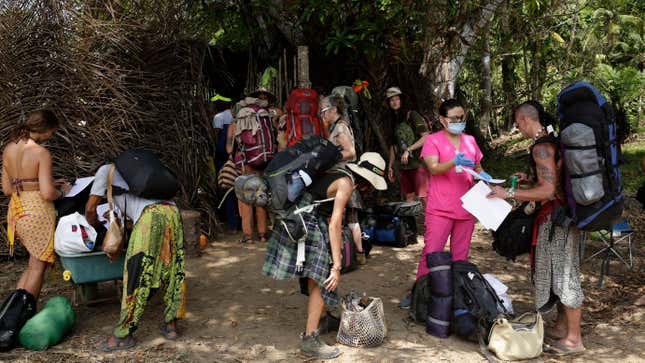Covid-19 Has Left a Bunch of Europeans Stranded at a Music Festival On a Panama Beach
Entertainment

Imagine Fyre Fest, except you can’t leave the island due to a global pandemic, there are a lot more white people with dreads, and there aren’t any adorable swimming pigs to distract you.
Dozens of people have been stranded on a Panama beach for over a month due to covid-19 lockdowns, and they say they’re receiving limited help from the British embassy.
The Guardian reports that 30 Brits are among those stuck at Tribal Gathering, a festival that touted itself as “like no other event on Earth.” The Tribal Gathering website claims that the two-week event isn’t a festival, but rather, “a place for the world to come together, where time is transcended, ancient and modern converge in symbiotic harmony, tribes share their precious ancestral wisdom as musicians call on the ethos of imagination.” But at the moment, it’s a place facing non-stop rain, an overrun sewage system, and increasingly grouchy patrons.
From The Guardian:
The festival was put in lockdown in mid-March after Panama declared a national emergency following its first coronavirus case. That meant many attendees missed their flights home. Some managed to leave the site and catch later flights, but others are still there.
Peter Grant, from Somerset, who volunteered in the kitchens at the festival, praised the organisers’ work to take care of them but said the Britons had received insufficient support from the British embassy and feared they could be stuck for months.
“We were in limbo for about a week,” Grant said. “Initially the embassy offered buses to Panama City but we only had 12 hours to decide. We also had no guarantee of being able to get a flight. In the end some of those people got their flights cancelled while they were in the airport queue.”
He said people were not keen to leave the site without knowing what would happen to them next. “At the time the beach was the safer option for us, and we were never offered those buses again.”
Tribal Gathering attendees who managed to get a bus back to Panama City were faced with canceled and exorbitantly expensive flights. The Guardian spoke with one woman who is stuck in Airbnb and is quickly running out of money.
A spokesperson for the Foreign and Commonwealth Office said that they are in regular contact with those still stuck on the beach, and that they’ve “provided details of available accommodation and have offered safe passage letters to assist in moving there.” But obviously the logistics are more complicated than they’re letting on.
A makeshift camp has been set up at the Tribal Gathering, where the remaining volunteers are battling dust, mud, and uncertainty about what the next days or even weeks will hold. Morale and mental health is reportedly dwindling—a circus performer who has been on the island for over 80 days told The Guardian that he’s “gagging for a wall”—but you’d never know it from the event’s official Instagram page, which has spent the last month posting cheerful content:
Further inspection of the event shows that while Tribal Gathering touts its relationship with indigenous communities around the world—from Guatemala to Malaysia—there is little information about the locals, indigenous or otherwise, and how the festival benefits them.
The Tribal Gathering website claims that fisherman sell their catch and other local and indigenous people sell food, fruits, and vegetables on-site. But they’re competing with the “three bars, ten restaurants/cafes, a bakery/pizzeria, smoothie bar, chai shops” that are also on the premises, run by festival attendee volunteers who—according to a woman who attended the festival in 2018—receive money credits on their cashless wristband system. It’s unclear whether the festival offers the locals additional financial compensation.
I have contacted GeoParadise, the charity that runs the festival, and asked about both pay and what exactly GeoParadise offers to the indigenous peoples other than an opportunity to get flown out and share their “ancestral knowledge” with a group that seems to consist largely of white British and German tourists. This story will be updated when they respond.
Despite the goals of the festival, it’s hard to parse through the official website and not feel as if the indigenous peoples are being fetishized. The festival’s acknowledgment of the plight that indigenous peoples face does not change it on its own. I’m hesitant to critique this in a way that denies the participants their agency, but it’s impossible not to go through the photos taken by attendees on Instagram and not get serious “6-Day Visit To Rural African Village Completely Changes Woman’s Facebook Profile Picture” vibes.
Besides, several days of the festival aren’t even dedicated to this ancestral knowledge in the first place. From the official website:
The first half is dedicated to the tribes with several zones offering workshops, ceremonies and indigenous music. There are also non indigenous presentations on topics like art and music, sustainable development and agriculture, health and nutrition, socioeconomic issues and more. Slowly the pace picks up and we seemingly travel through time to the finale of five days of electronic music and what might be described as our modern rituals of dance, art and creativity
In other words, it turns into Burning Man after the indigenous guests leave. And the down-to-earth, we’re-all-in-this-together ethos of the festival becomes even funnier when one notes the camping options: Ordinary camping grounds for tents and hammocks or the “glamping” option, located in a secluded part of the grounds with extra amenities. The highest glamping tier includes “showers, toilets and washing facilities, right at the waterfront to enjoy the relaxing sounds and breath-taking views of the Caribbean Sea.”
One love!